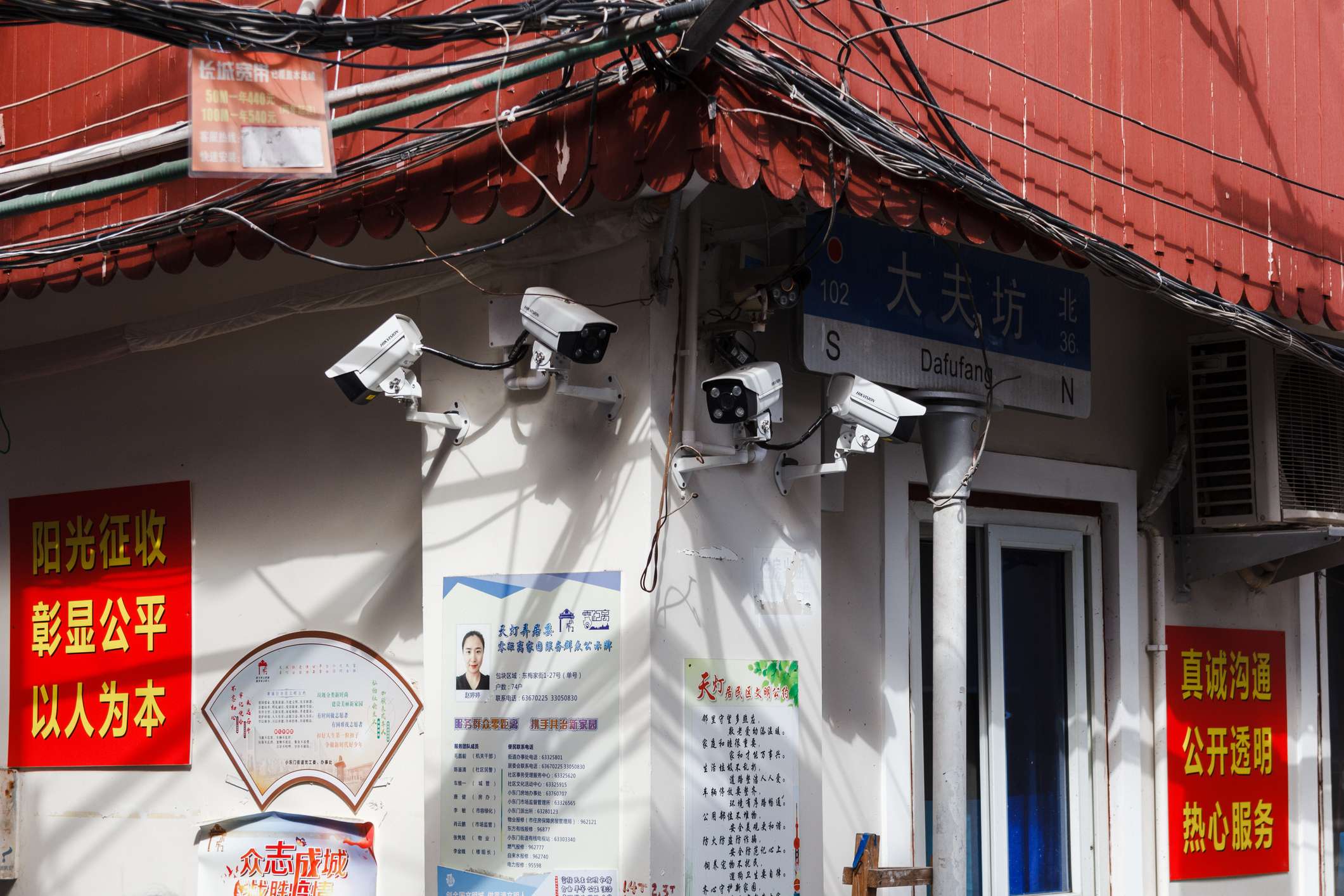
The AI (Artificial Intelligence) revolution is here, and it is changing everything from the way we write to the way we interact with technology. But not all change is good.
In 2015, the Chinese government launched the five-year Sharp Eyes initiative, vowing to build the world’s largest mass surveillance network. They have since installed more than 200 million CCTV cameras, extending across nearly every public space. The program goes well beyond the collection of basic visual footage. The authorities are integrating AI analysis, allowing them to pull up information on everyone they film. They are also monitoring smartphone and online activity, using algorithms to tabulate information and label citizens.
For years, this toxic mixture of AI and mass surveillance was unique to China. But as technology has advanced, mainland firms have begun to widen their net, hoping to turn a profit in foreign countries. This is especially problematic in the Middle East where authoritarian regimes exercise an enormous amount of control over the general public.
Saudi Arabia is hoping to top China’s AI and mass surveillance program. In 2022, their Council of Ministers approved a law that would require the use of security cameras in most public spaces, including communal areas of residential buildings. Their AI smart cameras can track when someone leaves their home, where they go, and what they are wearing—an important detail considering the nation’s controversial female dress code. Smartphones are also heavily monitored. The technology records and transmits everything, including highly personal information such as eye movement, facial features, and touch patterns. One app, Absher, was built to provide basic governmental services such as identification and permit applications. It also has a feature that allows men to track female members of their household. It will even send them a notification when the female leaves the city.
The Saudi Kingdom has turned data collection into an art form, bringing its AI and mass surveillance systems to the next level. When Crowned Prince Mohammed bin Salman Al Saud took over as head of state, he began touting his new plan to build a futuristic smart city known as “The Line.” It will be a reflective, hollowed-out wall with AI-inspired architecture, flying taxis, and one of the world’s most sophisticated mass surveillance networks. The cameras will use artificial intelligence to scan minute details, including irises, retinas, and body heat. AI can analyze that data and pick up on specific patterns, which can then be used to gain a deeper understanding of an individual’s behavior and mindset. It is a terrifying proposition in a state known for its public executions and extremist policies.
The Saudis are already using AI and mass surveillance to target those who speak out against the government. In April 2019, they arrested Abdullah al-Maliki, a human rights activist, who they tracked using facial recognition. In 2018, they used AI-powered spyware to hunt down journalist Jamal Khashoggi who was assassinated inside the Saudi Consulate in Istanbul.
It is not only dissidents and protesters who should be afraid. Saudi Arabia’s criminal justice system is built on their particular interpretation of Shari’ah Law, resulting in some of the harshest penalties on the planet. Petty crimes are met with public lashings. They sever hands for theft. Women are beaten for violating the state’s dress code. There are even laws that can be used to execute homosexuals, adulterers, and apostates, all of whom will be identified in greater numbers as the state’s AI systems evolve.
The United Arab Emirates (UAE) is widely considered to be a more progressive, laid-back nation. Their financial and commercial center, Dubai, is a playground for the rich, where head scarves can typically be worn without the more conservative abaya. But behind the city’s chic façade—hidden in incognito corners—one can find more than 35,000 smart cameras, all linked to government databases. The second a person passes by a lens, the camera can pull up their passport information.
In Abu Dhabi, the nation’s capital, they use a satellite surveillance system known as Falcon Eye, which monitors individuals from the moment they step outside their door to the moment they come back home. All social and behavioral patterns are analyzed by artificial intelligence, capable of determining an individual’s driving habits, their likelihood of committing a crime, and even their loyalty towards the government, among countless other things.
The UAE’s surveillance programs extend to all aspects of life, including social media, where they employ artificial intelligence systems that can analyze online images, videos, and sound. They can even detect irony and sarcasm in posts using sentiment analysis.
The UAE justifies its programs using rhetoric about geopolitical threats and the war on crime. When Anwar Gargash, the Minister of State for Foreign Affairs, was asked about his government’s surveillance network, he replied, “We live in a very difficult part of the world. We have to protect ourselves.” While this might be true, the UAE’s human rights record is just as abhorrent as Saudi Arabia’s. Dissidents are often arrested for speaking out against the government, and artificial intelligence has been integral in monitoring their activities.
It has been said that the UAE is obsessed with everything modern—phones, tablets, and computers. They are a nation of wealth, and they like their toys as do the police. This was readily apparent at a Dubai police conference in March of this year where Chinese tech companies showed off their latest gadgets.
These companies showcased lie-detecting brain scanners, AI sensors, and smart drones. They even revealed facial recognition glasses. The conference suggested a new type of policing, based on data and code, where predictive analytics could be used to stop crimes before they happen—and not just in Saudi Arabia or the UAE. Both AI and mass surveillance are spreading throughout the Middle East—in Qatar, Bahrain, and Israel—due in large part to exports from mainland China.
China’s prowess in the field is undeniable. In fact, both Saudi Arabia and the UAE receive a significant portion of their equipment from the Chinese tech firm Hikvision, which is one of the world’s leading smart camera manufacturers. There have also been reports that Huawei, a tech giant known for bugging its American smartphones, signed a deal to help to build a surveillance network in Dubai.
China is giving Middle Eastern dictators the power to eliminate grassroots activism. With AI and mass surveillance, they can detect when a crowd is about to form, making it impossible to hold rallies. They can monitor political discussions and look behind closed doors. The people will not be able to organize, which means they will not be able to escape the human rights abuses that have become so common throughout the region.








Cancel anytime


Using our website
You may use the The Middle Land website subject to the Terms and Conditions set out on this page. Visit this page regularly to check the latest Terms and Conditions. Access and use of this site constitutes your acceptance of the Terms and Conditions in-force at the time of use.
Intellectual property
Names, images and logos displayed on this site that identify The Middle Land are the intellectual property of New San Cai Inc. Copying any of this material is not permitted without prior written approval from the owner of the relevant intellectual property rights.
Requests for such approval should be directed to the competition committee.
Please provide details of your intended use of the relevant material and include your contact details including name, address, telephone number, fax number and email.
Linking policy
You do not have to ask permission to link directly to pages hosted on this website. However, we do not permit our pages to be loaded directly into frames on your website. Our pages must load into the user’s entire window.
The Middle Land is not responsible for the contents or reliability of any site to which it is hyperlinked and does not necessarily endorse the views expressed within them. Linking to or from this site should not be taken as endorsement of any kind. We cannot guarantee that these links will work all the time and have no control over the availability of the linked pages.
Submissions
All information, data, text, graphics or any other materials whatsoever uploaded or transmitted by you is your sole responsibility. This means that you are entirely responsible for all content you upload, post, email or otherwise transmit to the The Middle Land website.
Virus protection
We make every effort to check and test material at all stages of production. It is always recommended to run an anti-virus program on all material downloaded from the Internet. We cannot accept any responsibility for any loss, disruption or damage to your data or computer system, which may occur while using material derived from this website.
Disclaimer
The website is provided ‘as is’, without any representation or endorsement made, and without warranty of any kind whether express or implied.
Your use of any information or materials on this website is entirely at your own risk, for which we shall not be liable. It is your responsibility to ensure any products, services or information available through this website meet your specific requirements.
We do not warrant the operation of this site will be uninterrupted or error free, that defects will be corrected, or that this site or the server that makes it available are free of viruses or represent the full functionality, accuracy and reliability of the materials. In no event will we be liable for any loss or damage including, without limitation, loss of profits, indirect or consequential loss or damage, or any loss or damages whatsoever arising from the use, or loss of data, arising out of – or in connection with – the use of this website.
Last Updated: October 1, 2023
New San Cai Inc. (hereinafter “The Middle Land,” “we,” “us,” or “our”) owns and operates www.themiddleland.com, its affiliated websites and applications (our “Sites”), and provides related products, services, newsletters, and other offerings (together with the Sites, our “Services”) to art lovers and visitors around the world.
This Privacy Policy (the “Policy”) is intended to provide you with information on how we collect, use, and share your personal data. We process personal data from visitors of our Sites, users of our Services, readers or bloggers (collectively, “you” or “your”). Personal data is any information about you. This Policy also describes your choices regarding use, access, and correction of your personal information.
If after reading this Policy you have additional questions or would like further information, please contact us.
PERSONAL DATA WE COLLECT AND HOW WE USE IT
We collect and process personal data only for lawful reasons, such as our legitimate business interests, your consent, or to fulfill our legal or contractual obligations.
Information You Provide to Us
Most of the information Join Talents collects is provided by you voluntarily while using our Services. We do not request highly sensitive data, such as health or medical information, racial or ethnic origin, political opinions, religious or philosophical beliefs, trade union membership, etc. and we ask that you refrain from sending us any such information.
Here are the types of personal data that you voluntarily provide to us:
As a registered users or customers, you may ask us to review or retrieve emails sent to your business. We will access these emails to provide these services for you.
We use the personal data you provide to us for the following business purposes:
Information Obtained from Third-Party Sources
We collect and publish biographical and other information about users, which we use to promote the articles and our bloggers who use our sites. If you provide personal information about others, or if others give us your information, we will only use that information for the specific reason for which it was provided.
Information We Collect by Automated Means
Log Files
The site uses your IP address to help diagnose server problems, and to administer our website. We use your IP addresses to analyze trends and gather broad demographic information for aggregate use.
Every time you access our Site, some data is temporarily stored and processed in a log file, such as your IP addresses, the browser types, the operating systems, the recalled page, or the date and time of the recall. This data is only evaluated for statistical purposes, such as to help us diagnose problems with our servers, to administer our sites, or to improve our Services.
Do Not Track
Your browser or device may include “Do Not Track” functionality. Our information collection and disclosure practices, and the choices that we provide to customers, will continue to operate as described in this Privacy Policy, whether or not a “Do Not Track” signal is received.
HOW WE SHARE YOUR INFORMATION
We may share your personal data with third parties only in the ways that are described in this Privacy Policy. We do not sell, rent, or lease your personal data to third parties, and We does not transfer your personal data to third parties for their direct marketing purposes.
We may share your personal data with third parties as follows:
There may be other instances where we share your personal data with third parties based on your consent.
HOW WE STORE AND SECURE YOUR INFORMATION
We retain your information for as long as your account is active or as needed to provide you Services. If you wish to cancel your account or request that we no longer use your personal data, contact us. We will retain and use your personal data as necessary to comply with legal obligations, resolve disputes, and enforce our agreements.
All you and our data are stored in the server in the United States, we do not sales or transfer your personal data to the third party. All information you provide is stored on a secure server, and we generally accepted industry standards to protect the personal data we process both during transmission and once received.
YOUR RIGHTS/OPT OUT
You may correct, update, amend, delete/remove, or deactivate your account and personal data by making the change on your Blog on www.themiddleland.com or by emailing our customer service. We will respond to your request within a reasonable timeframe.
You may choose to stop receiving Join Talents newsletters or marketing emails at any time by following the unsubscribe instructions included in those communications, or you can contact us.
LINKS TO OTHER WEBSITES
The Middle Land include links to other websites whose privacy practices may differ from that of ours. If you submit personal data to any of those sites, your information is governed by their privacy statements. We encourage you to carefully read the Privacy Policy of any website you visit.
NOTE TO PARENTS OR GUARDIANS
Our Services are not intended for use by children, and we do not knowingly or intentionally solicit data from or market to children under the age of 18. We reserve the right to delete the child’s information and the child’s registration on the Sites.
PRIVACY POLICY CHANGES
We may update this Privacy Policy to reflect changes to our personal data processing practices. If any material changes are made, we will notify you on the Sites prior to the change becoming effective. You are encouraged to periodically review this Policy.
HOW TO CONTACT US
If you have any questions about our Privacy Policy, please contact customer service or send us mail at:
The Middle Land/New San Cai
100 Wilshire Blvd., 7th Floor
Santa Monica, CA 90401
USA
The Michelin brothers created the guide, which included information like maps, car mechanics listings, hotels and petrol stations across France to spur demand.
The guide began to award stars to fine dining restaurants in 1926.
At first, they offered just one star, the concept was expanded in 1931 to include one, two and three stars. One star establishments represent a “very good restaurant in its category”. Two honour “excellent cooking, worth a detour” and three reward “exceptional cuisine, worth a
Thank you for your participation,
please Log in or Sign up to Vote

123Sign in to your account